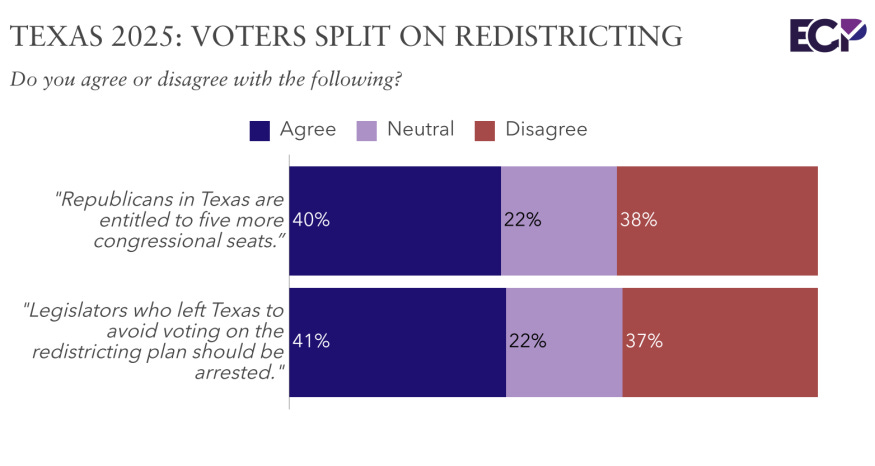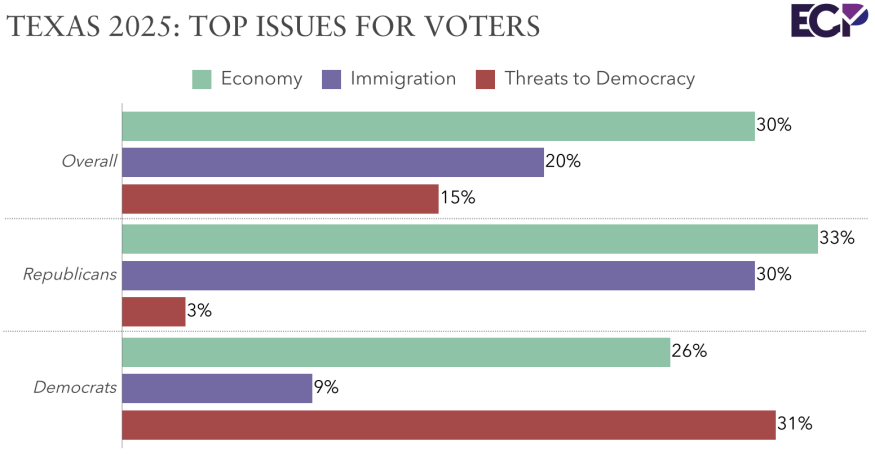New Poll Reveals Deep Divisions in Texas Over Redistricting and Senate Race
Emerson College Survey Highlights Partisan Split and a Dead-Heat GOP Primary
Texas voters are sharply split over the state’s controversial redistricting efforts as revealed by a newly released Emerson College poll, which also shows the race for the Republican nomination for U.S. Senate locked in a statistical tie. The poll, conducted August 11–12 and published by MyHighPlains.com, underscores both the heightened political tension in Texas and the critical issues shaping the 2026 elections.
Redistricting
The Emerson College survey of 1,000 registered voters found that 36% support Texas Republicans’ plan to redraw congressional maps before the 2026 midterms, while 38% oppose it and 26% remain unsure. The narrow difference reflects how deeply partisanship now permeates the state’s approach to voting rights, representation, and political power.
When asked about former President Donald Trump’s assertion that Republicans are “entitled” to five more congressional seats through redistricting, 40% agreed, 38% disagreed, and the remainder expressed no opinion. Among independent voters, opposition to the GOP-driven remapping outpaces support by nearly 20 points, suggesting a key block of swing voters may be swayed by the fairness of the process.
"Texas voters are paying close attention to state Republicans' effort to redraw Texas' congressional map to yield more GOP seats," Emerson College Polling stated.
Interest in the dispute is high: 35% said they’re following redistricting “very closely” and 43% “somewhat closely,” highlighting the process's visibility and stakes.
Party Lines and Public Perception
The party divide is stark. Among Republicans, 58% favor the GOP map while just 12% oppose it. By contrast, 70% of Democrats reject the plan and only 15% support it. Independents, whose votes will be crucial in battleground districts, are less certain but notably skeptical—43% against and 24% in favor.
The poll also gauged awareness of ongoing walkouts by House Democrats who left the state to prevent a vote on the new maps. A surprisingly robust 41% of all voters support efforts to compel their return for a quorum, including legal or law enforcement means, while 37% disagree and 22% remain neutral.
Senate GOP Primary
At the top of the ballot, the Republican primary for U.S. Senate remains wide open. Senator John Cornyn holds a slight 30% lead against Attorney General Ken Paxton at 29%. Still, with 37% of likely GOP primary voters undecided, the contest sits well within the poll’s margin of error. Pundits note that, in such a close race, former President Trump’s endorsement could prove decisive; among undecided Republicans, Trump’s job approval is a commanding 73%.
Should no candidate break 50% in the March primary, Texas rules mandate a runoff in May. This uncertainty looms large for both campaigns, with each intensifying outreach to the state’s sizable conservative grassroots.
GOP Holds Edge, But Room for Shifts
The Emerson poll also simulated November general election pairings. Cornyn holds a 45% to 38% advantage over Democratic Congressman Colin Allred; Paxton leads Allred 46% to 41%. Although both edges are outside the margin of error, a large proportion of voters remain undecided or open to changing their minds as the race develops.
For Democrats, Allred leads the party’s primary with 58% support, but one-third remain undecided—a sign that late entrants or unforeseen turns could yet shake up the field.
Texas Issues and National Implications
The poll found that the economy (30%) and immigration (21%) are the top issues for Texas voters, echoing earlier cycles where bread-and-butter concerns fueled turnout. Republicans are nearly evenly split between prioritizing economic concerns and immigration. At the same time, Democrats cite “threats to democracy” as a primary motivator—a reflection of how procedural fights like redistricting are now seen as existential political struggles.
Both Governor Greg Abbott (46% approval) and President Trump (49% in Texas) retain strong support compared to national averages, reinforcing the state’s status as a pivotal Republican stronghold despite shifting suburban demographics.
Looking ahead to 2028, Texas Republicans favor Vice President JD Vance (45%) by a wide margin, far outpacing Senator Ted Cruz (9%). Among Democrats, Secretary Pete Buttigieg (22%), Governor Gavin Newsom (20%), and Vice President Kamala Harris (17%) draw the most early interest.
Voter Engagement
If there is one theme uniting Texas’s electorate, it is a deep engagement with a process many now see as central to the future of fair elections in the state. That 78% of voters are watching the redistricting fight at least “somewhat closely” signals a never-before-seen level of civic alertness on what has often been a niche procedural question.
"It is clear that Texans will not only be closely watching how the redistricting standoff and Senate race unfold, but that their engagement could determine both state and national outcomes," said Spencer Kimball, executive director of Emerson College Polling.
The Stakes for 2026 and Beyond
The new Emerson College poll captures a state deeply riven by partisanship, animated by procedural fights over electoral maps, and uncertain about its political future. Neither Republicans nor Democrats can claim a decisive edge as both maneuver for advantage ahead of the 2026 midterms.
With so much still unsettled, candidates and voters alike are acutely aware that every decision—on mapping, campaigning, and turnout—could decide not only who leads Texas, but which party controls Congress and the country’s future for years to come.




